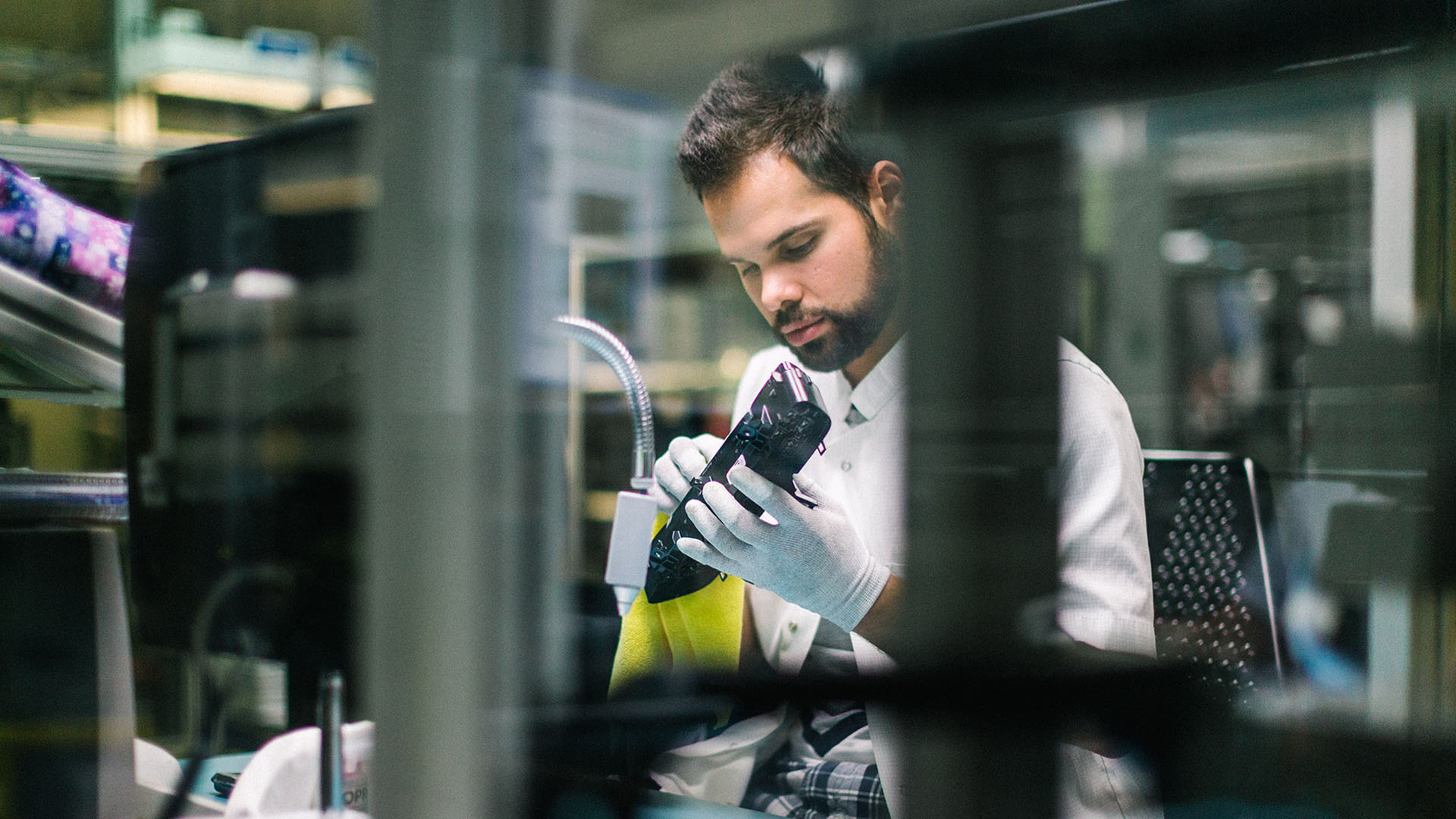Novares leverages DELMIA Production Planning and Scheduling
Novares is a supplier of comprehensive solutions that meet the needs of the automotive industry around the world.
“We continue to evolve. In the automotive industry, the market changes very quickly. We are in an organic growth phase with the implementation of new plants in Morocco, Slovakia, Romania and China. The DELMIA solutions will be part of the DNA of each of the plants that we are going to deploy.”
Using advanced plastic injection technology, Novares designs high-tech products to be embedded into vehicles of today and tomorrow that are easier to use and more ergonomic and affordable. Its expertise covers the design, manufacturing and assembly of components and the integration of advanced systems. Always designed to provide more value for automotive manufacturers, its solutions are equipped with complex mechanisms that use kinematics, mechatronics and multiple functionalities.
The Novares group designs, develops and manufactures injected plastic parts that meet vehicles’ autonomy and connectivity needs. The group’s business operations cover the engine, interior and exterior car body ranges, and include complex systems and mechanisms. Novares is positioned as a world leader in automotive equipment, supplying manufacturers like Peugeot-Citroën, Dongfeng, Renault-Nissan-Dacia, Ford, Fiat Chrysler, Toyota, General Motors, Jaguar Land Rover, BMW, SAIC and Volkswagen as well as suppliers like Yanfeng Johnson Controls, Faurecia, IAC, Continental and Visteon. In 2016, the Novares group, whose head office is located in France, posted adjusted revenues of €1.2 billion.
Seven product lines for very different processes
80,000 metric tons of injected plastic are produced every year. The 7 major product families are:
- Engine Components (water, oil and air treatment, acoustic and aerodynamic management and tanks)
- Bezels and Clusters (radio and climate control assemblies, instrument clusters)
- Air Vents and Decoration Trim (all types of air vents, lighted or not, decorated parts and small mechanisms like cup holders)
- Interior and Car Body Trim (trunk trim, dashboard components, roof consoles and wheel-arch fl arings, acoustic and aerodynamic parts as well as black parts)
- Handles (interior, exterior and fuel doors)
- Exterior Paint and Surfaces (painted and decorated parts, black parts, roof bars)
- E-Powertrain Components (electric and cooling system) Depending on these product lines, the processes are very different.
The DELMIA Production Planning & Scheduling solution is a response to Novares manufacturing constraints
Novares operates in a dynamic, competitive and constantly changing automotive market: increasingly broad diversity, more SKUs, more segmentation and more complex flows. “Our agility, responsiveness, customer service and ability to push the performance of our components and systems beyond market requirements and customer demands are critical in our business and for our group’s growth. Our goal is to make our plants more responsive to the actual demands of our customers by better managing production and using Lean Manufacturing principles to minimize inventories. The implementation of DELMIA fits perfectly in this context,” said Frédéric Marcotte.
From the manufacturing point of view: “Master Production Scheduling is an essential link with, in particular, the levelling of customer demand and the management of our capacities for improved forward certainty. We also have to take into account the complexity related to the diversity of our products and their processes. Each product requires a specific process. The plants must integrate all of these products and processes into a heterogeneous manufacturing environment that is also able to quickly adapt to new customer requirements.”
Key objectives of implementing DELMIA Production Planning & Scheduling
According to Marcotte, the team identified six key objectives for the new solution:
- Be able to produce realistic and executable schedules because they are developed based on production constraints: “We use different standard solutions. Thus we needed a tool to increase the reliability of our schedules.”
- Establish a longer scheduling horizon with more reliable lead-times: “Go from a horizon of a few days to a few weeks in order to extend this degree of reliability to the entire supply chain, and in particular, to our suppliers by reviewing and refining material and component supplies (less inventory, fewer stock-outs and fewer exceptional shipments).”
- Save time through automated, single-loop computation: “We wanted computation to be completely automated to avoid the tedious and unsynchronized steps and to save time for the people involved in planning.” The time freed up is used to assign resources to analyze the medium-term capacity plan.
- Obtain a bird’s eye view of the schedule with the ability to simulate and recalibrate the working orders in case of contingencies: “Make the right decisions.”
- Be able to optimize changeover time by taking constraints into account.
- Have a complete tool that can be used to centralize and share information with the necessary KPIs, flags and alerts to produce the schedule: “A single tool and a single source of information shared by everyone.”
Main benefits recorded using DELMIA Production Planning & Scheduling
• Better visualization. The tool is highly visual, which facilitates decision-making. “Compared to what we had, there is no doubt that our decision-making is faster and more efficient.”
• Time saving on producing the schedules and improved anticipation. Save time on managing short-term scheduling and thus leaves more time for medium-term scheduling.
• Management of alternative resources. It can be used to manage alternative machines: “an injection mold can be mounted on several pieces of equipment and the ability to integrate these constraints directly in the system makes us more efficient.”
• A single, benchmark system for everyone. A unique system replaces several tools.
• Configurable flags and alerts. Reliable, real-time flags and alerts while the schedule is being developed.
• A response to contingencies and constraints. The ability to level the workload and to work with more anticipation makes it possible to limit the frequent emergencies and unpredictables in automotive production.
DELMIA solution rolled out in 18 plants around the world in a little more than one year
Project Timing, Scope and Deployment Methodology
After a proof of concept was completed in late 2014, the decision was made to deploy DELMIA Production Planning & Scheduling across 18 plants within a relatively short timeframe. The core model was built in Q1 2015 and the rollout ran in parallel every month starting April 2015. “The scope is relatively global and covers the plants in China, India, Europe and Mexico. In this international context, the maturity, cultures and organizations are very different and this is one of the key features in project implementation,” stated Frédéric Marcotte.
The methodology was implemented jointly with the DELMIA team “whose efficiency and effectiveness had already been proven at other clients.” The starting point was a pre-audit conducted 4 weeks before kick-off to confirm that the plant was ready for deployment. Each plant did not have the same degrees of maturity and process control. The goal was to validate the prerequisites, that the bills of materials and manufacturing ranges were up-to-date, and the inventories were reliable. “If deviations are noted, action plans with relatively short timelines are implemented.”
After kick-off, the deployment was completed over 5 to 6 weeks, with the last steps performed on site: user training, integration testing, go-live and support. “A classic IT system rollout plan. The purely IT aspects (software installation, configuration of interfaces with SAP, tests) are managed jointly by our IT teams and the DELMIA team. Important things to keep in mind are overall we have the ability to start a plant every 5 to 6 weeks. Consequently, the rollout is fast and efficient.”
The tool meets all of our needs and our operating constraints.
Today, the benefits speak for themselves
Marcotte reports that the Group has seen performance improvements in several important areas:
The customer service level is 98.5% group-wide: “We have plants that weren’t at 100% before the tool was installed, which is a real bonus”, noted Frédéric Marcotte. Regarding the supplier service level, it is more than 90%. “We issue much more reliable delivery schedules and lead times with fewer changes, which lets us level out our demand at suppliers and consequently reduce inventory levels both at suppliers and in our plants.”
Plant productivity is improved: “The fact that production plans are realistic and executable lets us minimize unforeseen changeovers. This occurs in any industry. If we don’t plan ahead, we suffer the consequences. We have seen real savings in this area across all plants that have deployed the solution.”
Reduced inventories: The average inventory levels are 8 days: “This includes materials, semi-finished components and finished goods. In some cases, this represents 30 to 40%less inventory and thus substantial savings.” The risks of obsolescence have been reduced since the plants produce as close as possible to customer demand. Finally, exceptional shipments (plant/customers or suppliers/plant) have mostly been eliminated.

Organizational benefits
According to Marcotte, the Group has seen benefi ts/performance improvements in a number of areas:
- Enhanced teamwork: “At the same time that DELMIA was being implemented, the production planners who previously were part of the production teams were transferred to the logistics department.”
- Structured communication: “We only have one source of information and it is shared.”
- Improved decision-making, which requires less effort and is faster: “Across all plants, a 30-minute maximum daily meeting is suffi cient between logistics and production. Things are clear; we do not rehash decisions and the day proceeds naturally and calmly.”
- Improved accountability: “All scheduling depends on a single role, where responsibilities were shared previously.”
Goal
- Be able to produce realistic and executable delivery schedules for Novares automotive manufacturer clients and offer a 360° bird’s eye view of projects.
- Have a scheduled, long-term and reliable outlook in order to chart the requirements through the entire supply chain starting from Novares suppliers.
- Have a comprehensive tool that can centralize and share information, accommodating an international context with different work cultures and methods, which is one of the key project features.
Solution
Novares, an automotive supplier specializing in plastic injection, has equipped 18 manufacturing plants around the world with DELMIA Production Planning & Scheduling solutions.
Benefits
- Improved performance: a group-wide customer service level of 98.5%, and 90% for suppliers
- Realistic and executable production plans that improve plant productivity
- Reduced inventory levels and obsolescence, and elimination of exceptional shipments
- Organizational benefits: teamwork has developed, communication is better structured and decision-taking has improved with better accountability, better control and improved anticipation

Novares Close Up
Products: A range of solutions that cover seven product lines comprised of 19 product segments with more than 36,000 part SKUs. Positioned in the engine compartment and interior and exterior car body parts market, Novares serves more than 15 major brands daily, has more than 70 automotive clients and its parts are present on more than 400 vehicle models.
Head Office: Clamart, France
Founded: 1955
Personnel: 10,000 employees in 21 countries
For more information: www.novaresteam.com

